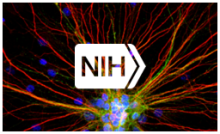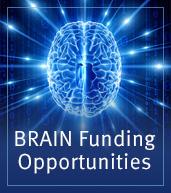
NIH announces three re-issued Requests for Applications (RFAs) for team-based interdisciplinary projects using advanced and innovative technologies to examine high-impact questions in human neuroscience and address overarching principles of circuit function as they relate to behavior.
NIH announces three re-issued requests for applications (RFAs) for the BRAIN Initiative. All three RFAs use team-research funding mechanisms (U01 and U19), encouraging diverse and multi-disciplinary teams of researchers to collaborate towards investigation of high-impact human neuroscience and innovative studies of circuit function.

RFA-NS-19-001 Research Opportunities Using Invasive Neural Recording and Stimulating Technologies in the Human Brain (U01 Clinical Trial Required)
Invasive surgical procedures allow for precise recording and stimulation within specific brain structures in humans, but the technology is often limited by the number of patients and available resources for conducting complex experimental protocols. Rarely are these resources aggregated in a manner that addresses research questions with appropriate statistical power. Therefore, this RFA seeks applications to assemble diverse, integrated, multi-disciplinary teams that cross boundaries of interdisciplinary collaboration to overcome these fundamental barriers and to investigate high-impact questions in human neuroscience. Projects should maximize opportunities to conduct innovative in vivo neuroscience research made available by direct access to brain recording and stimulating from invasive surgical procedures. Projects should employ approaches guided by specified theoretical constructs and quantitative, mechanistic models where appropriate.
Awardees will join a consortium work group, coordinated by the NIH, to identify consensus standards of practice, including neuroethical considerations, to collect and provide data for ancillary studies, and to aggregate and standardize data for dissemination among the wider scientific community.
Unlike previous versions, this RFA will support 5 years of a research project. The application receipt date for this RFA is November 14, 2018. Subsequent receipt dates are October 18, 2019, June 19, 2020, and October 19, 2020.
RFA-NS-19-002 Team-Research BRAIN Circuit Programs – TeamBCP (U19 Clinical Trial Required) and RFA-NS-19-003 Team-Research BRAIN Circuit Programs – TeamBCP (U19 Clinical Trial Not Allowed)
This complementary pair of RFAs will support integrated, interdisciplinary research teams that focus on examining circuit functions related to behavior, using advanced and innovative technologies. The goal will be to support programs with a team science approach that can realize meaningful outcomes within 5-plus years. Awards will be made for 5 years, with a possibility of one renewal. Projects will incorporate overarching principles of circuit function in the context of specific neural systems underlying behavior, while also incorporating theory-/model-driven experimental design and offering predictive models as deliverables. Therefore, applications should seek to understand circuits of the central nervous system by systematically controlling stimuli and/or behavior while actively recording and/or manipulating relevant dynamic patterns of neural activity and by measuring the resulting behaviors and/or perceptions. Applications are expected to employ approaches guided by specified theoretical constructs, and are encouraged to employ quantitative, mechanistic models where appropriate. Applications will be required to manage their data and analysis methods in a prototype framework within the proposed U19 project and exchanged with other BRAIN U19 awardees. Model systems, including the possibility of multiple species ranging from invertebrates to humans, can be employed and should be appropriately justified. Programs should employ multi-component teams of research expertise – including neurobiologists, statisticians, physicists, mathematicians, engineers, computer scientists, and data scientists, as appropriate – that cross boundaries of interdisciplinary collaboration.
Based on the new NIH definition of clinical trials, applicants proposing programs that include human subjects with invasive neural recording must apply to RFA-NS-19-002. Applicants proposing programs that do not include human subjects with invasive neural recording must apply to RFA-NS-19-003. The application receipt date for both RFAs is October 30, 2018. Subsequent receipt dates are October 30, 2019 and October 30, 2020.
Please visit our Active Funding Opportunities page for more details on these and other RFAs for the BRAIN Initiative.
